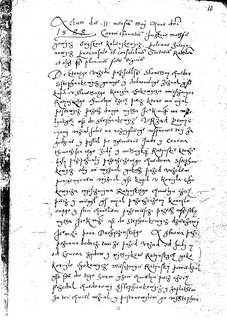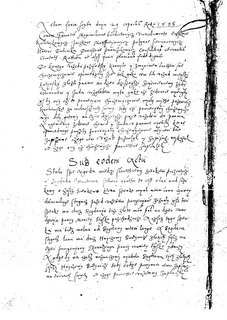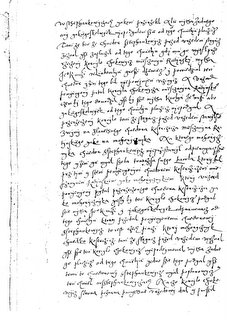I told him he got the wrong guy.
So, instead, let me marshal my stuttering blog abilites and ask my readers for help. Ahh, the power of the hive mind.
The reader suggested Old Polish. Iimmediately concured (because I know no better). The contents definitely seem Slavic. If I could isolate a word, I'd google it. I see a "danya" in the tenth line of page 10. Apparently not a name (lowercase), but what? On the second line of that same page, I see a "Coram", which I presume is a city in Poland. The year 1588 seems to be written in the opening lines, as well. I also think I've seen Latin scattered throughout the letters.
What language? What period? What meaning? (How much can I get on Antique Roadshow?) Most important, I must know what this tells us about Mary Magdalene and the Grail, otherwise it's a wash.




7 comments:
Interesting. I have to run, but I'll try to say a few things: I think the "Coram" is actually part of a Latin phrase "coram famatis", meaning something like "in the presence of the (in)famous)..."
The possibility occurred to me that this writer might be mixing the cyrillic with the Latin alphabets. There is a probable slavic word "znam", which looks like the word "to know". In the cyrillic the "m" would sound like a "t".
The opening line suggests a legal document "Done on the 11th x" of May(?)
I like this mystery, I'll have to get back to this. Good luck!
Page 1 7th line third word from the right looks like "dobrowolnie", meaning "freely" in modern Polish.
There seem to be thetas and etas in there. If you ever learn what these are doing in 16th century script please let me know.
Last thought: at times the coram infatis... brackets a long line of names ended by "consulibus civitatis Ra(illegible)." My guess is that this means "in the presence of the renowned consuls of the city of Ratisbona", Ratisbona being present-day Regensburg, a major city in 1588.
Thanks for the fun.
The print is tough, since I damaged my eyes reading the Oxford English Dictionary--the single, all-inclusive one.
E: Where is your site counter and such?
Niki,
Click on the pages to enlarge them in a separate screen.
For some reason, at some point, a whole stretch of my sidebar HTML got erased, and I just haven't had the interest to rectify it. The numbers are a distraction (though I do miss seeing who's visited FCA from where).
If you still care...
It's definitely Polish, with a Latin intro.
Actum die 11 [????sis] (long-s, I, ending-s like German)Mai Anno dom 1588. Coram famatis [pol. Jruzkow maisto ?onycz. Oniskowe Kalienjkowjcz, poliane Si???o nowjcz] proconsule et consulibus Civitatis Rattn??? et aliis ?? plenimis fide dignis
Do klonego v?zetu przisedlszi slav???
It's all 16th century Latin with the few special Polish characters..
I bet if you look up something like "poland 11 may 1588" you might find something.
dcostello:
Thanks, I still do care! I found this as a significant day in history:
"By May 11, 1588, the Great Armada was complete and set sail from Lisbon, Portugal. One hundred thirty ships carrying 30,000 men sailed in an orderly procession behind the ship of Medina, which carried the Spanish standard."
And this: "The Holy League... [was] formed by Catholic princes in France, supported by Spain, in response to the agreement of May 6, 1576, by which the royalty conceded important advantages to the Protestants. In May 1588, a confrontation took place in Paris between the leader of the League, Duke Henry of Guise, and King Henry III. ... On the evening of May 11, 1588, the companies of the bourgeois militia that appeared the most faithful were placed by the king in strategic locations...."
Post a Comment